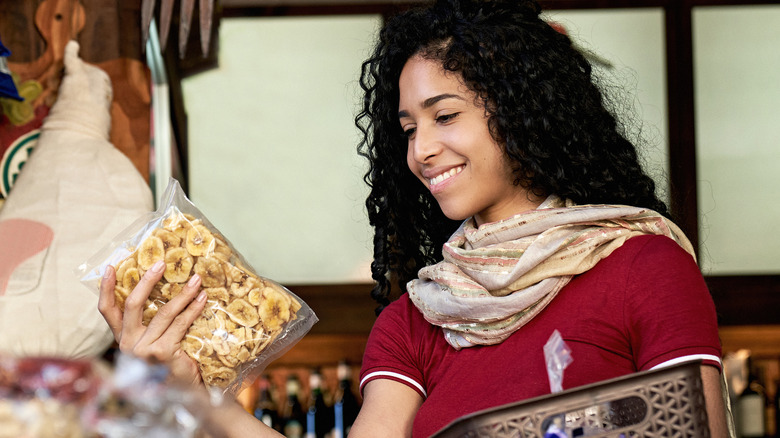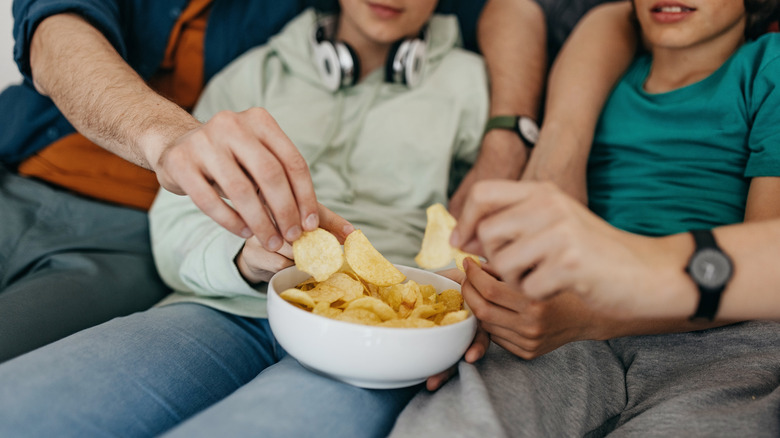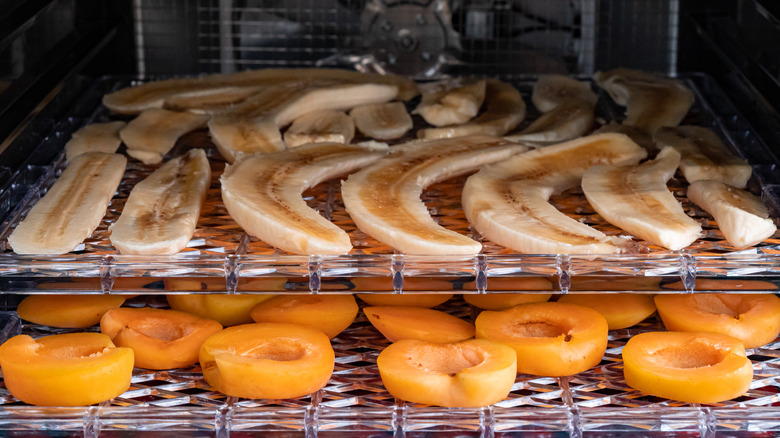Are Banana Chips Good For You?
If you're looking for a snack with a nutritional boost, look no further than a ripe banana. According to the U.S. Department of Agriculture (USDA), in one medium-sized banana (between 7 and 8 inches long), you'll find over 10 milligrams of vitamin C, 26 milligrams of phosphorus, and nearly 32 milligrams of magnesium. Among its many vitamins and minerals, a banana's real superpower is in its potassium content. In the same medium-sized banana, you'll find a hefty 422 milligrams of potassium. However, all of these measurements apply to raw bananas. Does this mean that the same nutritional value can be found in banana chips?
Although banana chips are fried rather than raw, there is still some nutritional value to be found. As per the USDA, a 100-gram serving of banana chips contains 56 milligrams of phosphorus, 76 milligrams of magnesium, and 536 milligrams of potassium. While at first glance it may appear as if banana chips actually surpass raw bananas in terms of nutrient content, they do come with some major drawbacks.
Banana chips versus potato chips
The vitamins and minerals that can be found in banana chips essentially end up getting canceled out when you factor in the fact that these sliced snacks are often cooked in oil, syrup, or flavored with added salt (via Healthline). In a 100-gram serving of banana chips, you'll find over 35 grams of sugar (via USDA). That's a fair amount of sugar when you consider that the American Heart Association (AHA) recommends that men consume no more than 36 grams of added sugar daily and no more than 25 grams for women. In that same serving of banana chips, you'll also find 33.6 grams of fat. However, only 1.95 of those grams are monounsaturated fats, or "healthy fats."
But surely banana chips have to be a better option than potato chips, right? If you compare 1 cup of banana chips to 1 cup of potato chips, you'll find that banana chips surpass potato chips when it comes to sugar, carbs, and saturated fat. While 1 cup of potato chips contains 0.1 grams of sugar, 0.85 grams of saturated fat, and 13.5 grams of carbs, 1 cup of banana chips contains 25 grams of sugar, 21 grams of saturated fat, and 42 grams of carbs.
Try your hand at homemade banana chips
While a raw banana may be an overall healthier option compared to a bag of banana chips purchased from the store, it doesn't mean that we have to forgo banana chips altogether. Rather, baking your own banana chips can give the snack a healthier edge. "The nutritive value of banana chips depends a lot on the method of cooking. If they are deep-fried, it may put [on] an extra load of calories that may surpass the nutritional value of both banana and coconut oil," explains nutritionist Nmami Agarwal to NDTV. "However, if banana chips are baked or prepared using an air-fryer, with minimal oil — they can be enjoyed sometimes as part of a healthy diet."
But using healthier cooking methods doesn't mean you have to sacrifice flavor. Instead, Agarwal suggests substituting herbs for sugar to give your banana chips a little extra savory taste. Alternatively, PopSugar recommends using cinnamon. To do so, peel four medium ripe bananas and cut them into 1/4-inch slices. Using 3 tablespoons of orange juice or lemon juice, dunk each slice into the juice and place them on a baking sheet lined with parchment paper. Dust them off with some cinnamon before baking at 200 degrees Fahrenheit for approximately three to four hours. Just remember to turn them over at the halfway point, let them cool, and enjoy!



